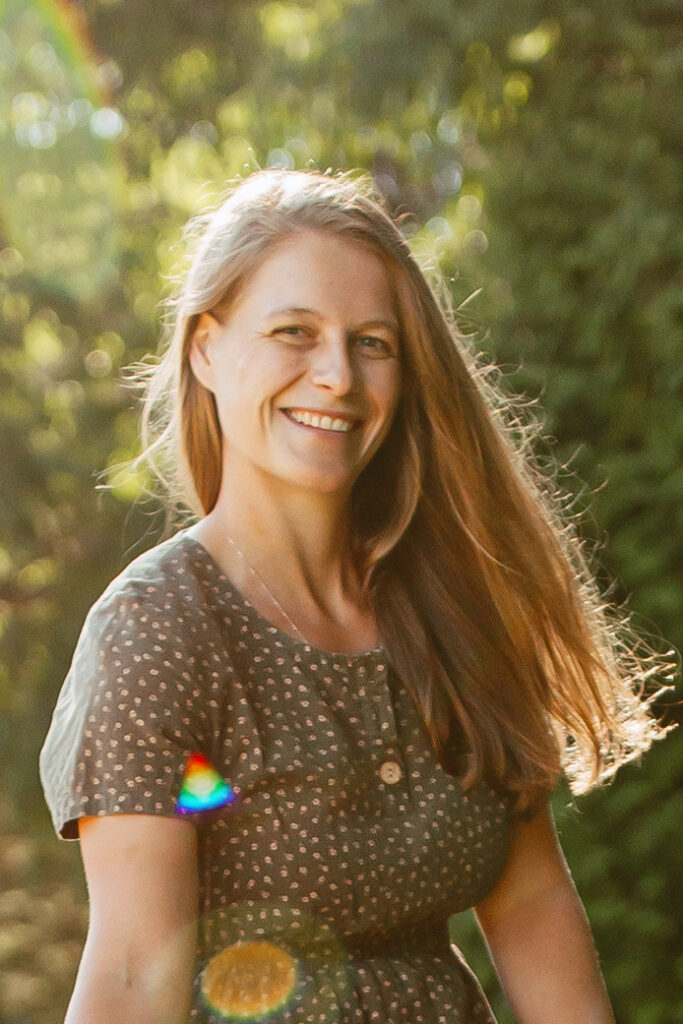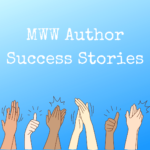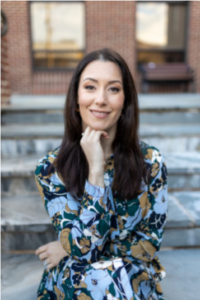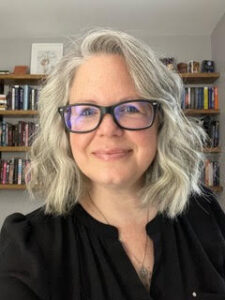Meet Maggie Sadler
 Maggie Sadler earned her joint Masters with honors in Comparative Literature and English from the historic University of St Andrews and her Masters in Literary Studies from Memorial University of Newfoundland, where her literary interests ranged from folklore retellings to nineteenth-century maritime adventure fiction and interrogating audience reception across creative mediums. Outside of the agency space, Maggie also works as an editor and writing coach. Maggie marries these complimentary experiences with an intentional, intelligent, and growth-minded approach as a literary agent.
Maggie Sadler earned her joint Masters with honors in Comparative Literature and English from the historic University of St Andrews and her Masters in Literary Studies from Memorial University of Newfoundland, where her literary interests ranged from folklore retellings to nineteenth-century maritime adventure fiction and interrogating audience reception across creative mediums. Outside of the agency space, Maggie also works as an editor and writing coach. Maggie marries these complimentary experiences with an intentional, intelligent, and growth-minded approach as a literary agent.
Maggie primarily seeks literary and upmarket adult fiction with distinct character voices, lyrical prose, and propulsive plots. She loves books that unapologetically challenge and deconstruct genre, narrative, or structural conventions—books that take risks. She appreciates a careful, restrained hand with fabulist elements, one that gently asks the reader to reconsider the boundary between the real and the fantastic. Above all, Maggie craves stylish writing and wholly unique concepts that leave her feeling devastated over the palpable talent.
A writer herself, Maggie draws inspiration from folklore, sweeping landscapes, and untamed femininity as she scribbles away at her debut novel. When not reading or writing, Maggie can usually be found exploring astride her rascally horse, admiring various species of moss on hikes with her partner, or taking up yet another hobby—currently, mounted archery.
Maggie will be teaching “Unpacking the Submission Package – Query Letters “ and participate in Friday evening’s “First Page Read – Love It or Leave It.” She is also on the Query Letter/First Page Critique team.
Wishlist
- Literary fiction written in lyrical, artful prose with carefully crafted tension
- Literary fiction with speculative flavors—let’s get weird
- Upmarket fiction, especially with emotionally complex characters who explore evocative settings
- Untold and/or underrepresented historical fiction (pre-twentieth century, please)
- Urban Fantasy/Magical Realism rooted in our reality
- Folk and fairy tale retellings—the more stunning the twist, the better
- Work from Indigenous/First Nations authors, as well as other historically marginalized and underrepresented voices
- Narratives that interrogate themes of cultural identity, femininity, family legacy, rebellion against tradition, and self-discovery from a fresh, unorthodox perspective
- An experienced traveler, Maggie also welcomes nonfiction travel narratives depicting remote locations and thought-provoking encounters in a raw, authentic, and intentional narrative voice.
- Maggie is not looking to acquire high fantasy, hard sci-fi, commercial romance, or children’s books at this time.
Maggie would love to discover the next…
- Poet turned prose writer
- Folklore retelling of ambitious, perhaps even monstrous, women who are willing to sacrifice love for power
- An eerie, evocative Gothic setting à la Wuthering Heights
- Endearing and cozy upmarket fiction with the gentlest touch of magic, one that strikes the same notes, atmospherically, as Ghibli’s Howl’s Moving Castle
Take a look at bios and wishlists for our full Agent Faculty
Check out the Agent Fest Online schedule!
Register for Agent Fest Online 2024
Q&A with Maggie
MWW: You’re giving a session about query letters, a crucial part of the path to publication. What elements of a query letter draw you in? Conversely, what are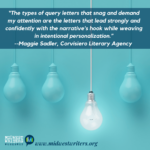 some red flags?
some red flags?
MS: I’ll lead with the negative so we can end on a positive! I think my most significant red flag is any language that treads the path of “You have never seen a book like this before” or “This will be an instant bestseller.” Unfortunately, this language suggests a lack of understanding as to how the industry intrinsically functions (read: lack of research!) and raises questions such as why there might not be a book like this on the shelves—is the hook or concept not strong enough? Is there an audience for this book? Furthermore, no one can guarantee bestseller status, so while goals are lovely to nurture, this suggests to me that the author will ultimately struggle when confronted with the realities of a somewhat fickle industry.
The types of query letters that snag and demand my attention are the letters that lead strongly and confidently with the narrative’s hook while weaving in intentional personalization. It’s essential that authors be mindful of the fact that agents can read over a dozen query letters per day, so we crave the opportunity to step right into what is compelling about the narrative, as well as why the author thinks that this could be an effective and rewarding working relationship. It is a brave and vulnerability-inducing experience to trust someone to read your work, so it is imperative that an author feels a connection with the agent they’re querying and speaks honestly about that!
MWW: Is the presence of AI changing the way agents look at manuscripts? Some writers have been relying on it or at least using it in their work. Can you tell when that’s the case?
MS: The potential of AI is certainly intriguing, and from a professional standpoint, its efficacy in ensuring productivity is attractive. That being said—and perhaps this stems from a little too much Battlestar Galactica in my formative years—I think, to some extent, AI can also induce some anxiety because of that potential. As AI continues to develop, I think there could be an even more distinct craving for very human narratives—as raw, disjointed, and emotional as they may be. A kernel to chew on!
Speaking to the ability to identify the use of AI in a manuscript, in my experience, it boils down to the author’s ability to utilize the tool effectively, as AI, in the realm of writing, is just that—a tool. Perhaps the distinction could be likened to cake—one can distinguish a completely homemade cake from a cake made from a boxed mix (but perhaps jazzed up a bit with extra ingredients or decorative flair) and/or a pre-prepared cake purchased at the grocery store, no?
 MWW: What are some ways an author can balance what they want to write with what will sell?
MWW: What are some ways an author can balance what they want to write with what will sell?
MS: This is a great question and one I often discuss with my authors both in the agency space and as a writing coach. The conversation here can be distilled into two key components: managing expectations and, subsequently, developing an actionable plan.
In an ideal world, we could all create l’art pour l’art, and, to some extent, I do encourage authors to remain true to their creative energy. However, this energy should be tempered by acknowledging the realities and constraints of the industry, as well as the author’s ultimate vision for their work. The question then evolves to one of priorities: do we preserve every unique and deliberate break from stylistic or genre convention to stay entirely true to the artistic vision (at the expense, maybe, of narrative accessibility), or do we distill some of those choices down to broaden the narrative’s reach? I like to work with authors to develop an actionable list of key elements they feel quite passionately about to be put forth for discussion further down the pipeline, as well as a list of what they would be willing to workshop further to help improve the narrative’s accessibility, reach, and saleability. Ultimately, recognizing that there should be a balance early on in one’s author journey can help alleviate a touch of creative heartbreak!
MWW: What’s your favorite quote about reading or writing?
MS: I’m a bit of a hobgoblin when it comes to quote collection, but I think my favorite quote, while it doesn’t necessarily directly speak to reading or writing, can enrich those experiences. From the perennial classic about a beloved, burgeoning authoress, Anne of Green Gables: “‘Don’t give up all your romance, Anne, a little of it is a good thing—not too much, of course—but keep a little of it.'”
In the face of an overwhelming world, let us all romanticize the small, delicate things around us, our dreams, and our community as book lovers just a little bit.
Register for Agent Fest Online 2024
Meet Celia Cook, Maggie Sadler’s Assistant for AF2024
 Midwest Writers Workshop likes to include interns, mostly college students majoring in English, to coordinate and facilitate the agents’ pitch schedules. You’ll be hearing from them regarding your appointment time, and they’ll help you meet the agents in the Zoom room when it’s time for your pitch.
Midwest Writers Workshop likes to include interns, mostly college students majoring in English, to coordinate and facilitate the agents’ pitch schedules. You’ll be hearing from them regarding your appointment time, and they’ll help you meet the agents in the Zoom room when it’s time for your pitch.
Celia Cook (they/she) is a graduate student currently stranded in Muncie, Indiana. They mostly write fiction and nonfiction, but have an interest in anything and everything related to writing, which is why she’s so excited for Agent Fest!
At twelve years old, Celia wrote the first draft of what would become her first self-published novel Rise of the Ieta. They earned their degrees in English and Psychology at the University of Maryland, College Park in 2022. At UMD, they were a part of two living-learning communities: Arts Scholars and the Jimenez Porter Writers’ House. After graduating, Celia presented at AwesomeCon in 2023, began reading for The Rumpus and River Teeth, and entered the Creative Writing MA program at Ball State University.
Some other wild things about Celia: she’s traveled to all fifty states, Canada, Costa Rica, England, Iceland, Italy, Ireland, Germany, Greece, and a brief trip to the Netherlands. Currently, they are busy writing two books, buying too many cardigans, and baking banana bread. You can learn more about them here.
Finish an essay, a book, a paragraph? Have something published? Tell us about something exciting you’ve done with writing and/or publishing in the past year. Bonus points if you can tell us how MWW has made an impact on your writing.
Send your success stories to midwestwritersworkshop@gmail.com and we’ll post it on the new tab on our website landing page!

Anyone with a message and story to share can write and publish a great book. It won’t be easy—but if you’ve got the hunger and the right plan, publishing a book is within every writer’s reach. Get HUNGRY AUTHORS and grab your bonuses at hungryauthors.com/book.

